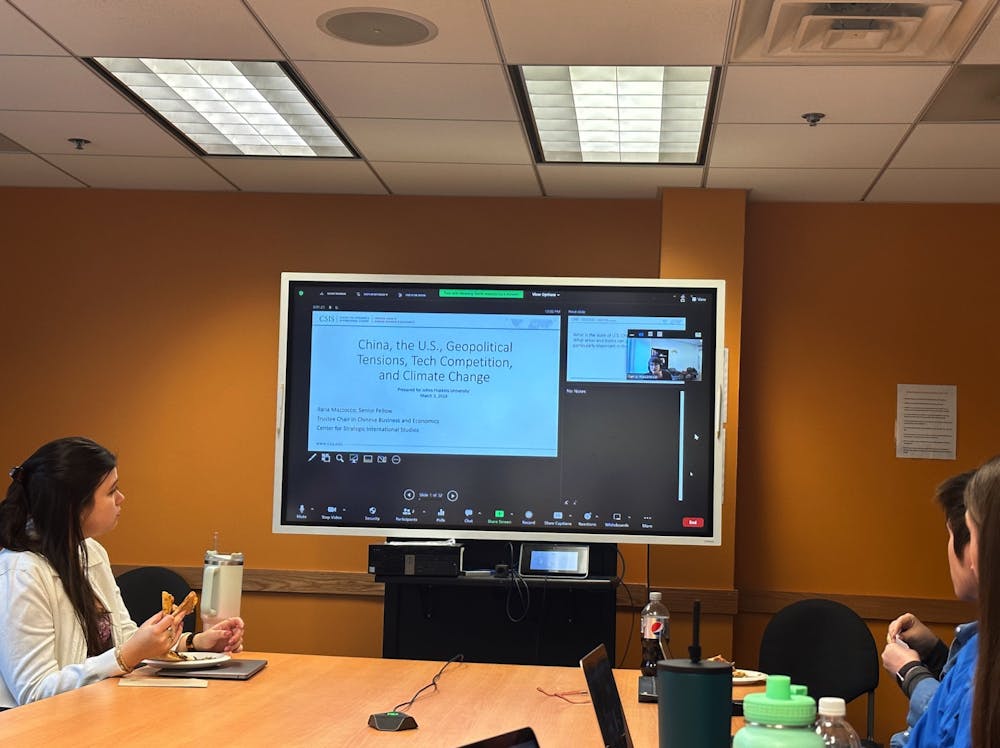The Aronson Center for International Studies and the International Studies Leadership Council (ISLC) hosted Ilaria Mazzocco to discuss China as an emerging global power on March 3. The lecture was part of the ISLC’s 2023 Speakers Series, “Emerging Threats in the New World Order.”
Mazzocco is an international affairs specialist with a focus on Chinese economics, business, politics and energy and sustainability. She holds a master’s and a doctoral degree from the School of Advanced International Studies and previously worked as a senior research associate at the Paulson Institute. Currently, Mazzocco is a senior fellow with the Trustee Chair in Chinese Business and Economics at the Center for Strategic and International Studies.
Mazzocco’s talk examined the growth of China as an international power, especially in connection to climate change and renewable energy. She explained that China’s position has changed over the past few decades as the nation grew more significant in the global economy.
Mazzocco began the talk by describing how Chinese manufacturing became important in the global supply and value chain.
“In many cases, [the value chain] is globalized. The scientists may be in the U.S., but they may be piloting the things in Europe, and they produce them in China, or the components get produced all over the world, and then they may be assembled in China,“ she said. “China is really important for a lot of that manufacturing because the big advantage of producing these in China is that they can be done at a huge scale, which means much cheaper prices.”
She asserted that while interdependence was historically believed to be good, there has been a shift in perspective. Governments and policymakers are growing concerned about becoming too reliant on global markets, which could make countries heavily influenced by incidents in other nations.
She specifically drew attention to solar panels. In the past, China and the U.S. have cooperated to reduce greenhouse gas emissions, since they are the two countries with the highest emissions. The California-China Climate Institute was formed as a joint effort to research environment-friendly technologies and policies.
However, Mazzocco argued that the shared research between China and the U.S. has become controversial recently, as the public realize that solar panels, among many other green technologies, are also linked to economics.
“It's becoming much clearer that when you're building a wind turbine, it creates jobs,“ she said. “There's a supply chain behind it. There are also cost benefits to where you build it, who builds it, companies and investment flows, so there's a whole economy behind it. There's increasing interest in many different countries to capture some of those economic benefits because these are going to be key to the energy systems for the next century.”
In an email to The News-Letter, graduate student Yida Jiao described his thoughts on Mazzocco’s perspective on the economic policy of China.
"I am interested in the topic of the rising of China and want to see how it relates to environmental issues," he wrote. "The opinions of the speaker are quite objective and sober... she described how the industrial policy of China might not work at all and the autonomy of regional governments."
While solar panels were first piloted in the U.S., China is now the biggest solar panel manufacturer. Mazzocco noted that the cost of creating solar panels drastically fell when Chinese companies started manufacturing them, and currently, China is making most of the components in solar panels. Since it is important to diversify supply chains, Mazzocco said that it is better for more countries to get involved in solar panel production.
She emphasized the dangers of interdependence, noting that the supply of solar panels may be cut off from the world if anything happens in China. However, she also raised concerns about making supply chains domestic since it may raise costs significantly, among other challenges.
“These are all technologies that really developed in an age of globalization and integration between countries,” she said. “Now, we have to figure out how to make them work and how to innovate in an era in which globalization may no longer be progressing. I wouldn't say that we're deglobalizing, but there's certainly a lot more controls and barriers between countries, so it's a very different age.”
Graduate student Mingtang Liu shared what he learned from attending the talk in an email to The News-Letter.
“The biggest takeaway was to see how dominant China is in global manufacturing, especially in some of the green tech sectors,” Liu wrote. “But I hope that we can get into more specifics about China's industrial policy, its design and implementation across different sectors of the economy and how it stirred debates in the U.S.”





